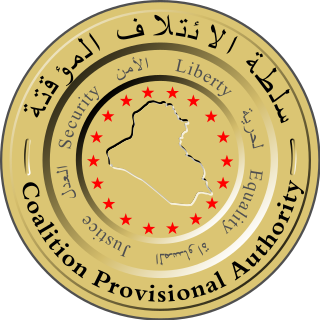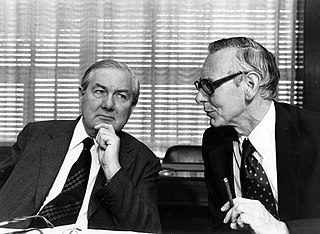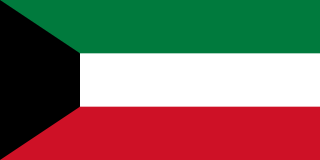
Ibrahim Abdul Karim al-Eshaiker, better known as Ibrahim al-Jaafari, is an Iraqi politician who was Prime Minister of Iraq in the Iraqi Transitional Government from 2005 to 2006, following the January 2005 election. He served as Minister of Foreign Affairs from 2014 to 2018.

The Iraqi Governing Council (IGC) was the provisional government of Iraq from 13 July 2003 to 1 June 2004. It was established by and served under the United States-led Coalition Provisional Authority (CPA). The IGC consisted of various Iraqi political and tribal leaders who were appointed by the CPA to provide advice and leadership of the country until the June 2004 transfer of sovereignty to the Iraqi Interim Government.

In many countries, the ministry of foreign affairs is the highest government department exclusively or primarily responsible for the state's foreign policy and relations, diplomacy, bilateral, and multilateral relations affairs as well as for providing support, including consular services, for a country's citizens who are abroad. The entity is usually headed by a foreign minister or minister of foreign affairs. The foreign minister typically reports to the head of government.

Khalifa bin Salman Al Khalifa was a Bahraini royal and politician who served as the Prime Minister of Bahrain from 10 January 1970 until his death in 2020. He took office over a year before Bahrain's independence on 15 August 1971. At the time of his death, he was the longest-serving prime minister in the world. Under the 2002 Constitution he lost some of his powers, with the King now having the authority to appoint and dismiss ministers.

Khalid bin Ahmed Al Khalifa is a Bahraini diplomat who served as Bahrain's Minister of Foreign Affairs from 2005 until January 2020. Khalid became only the second foreign minister in Bahrain's history after replacing Mohammed bin Mubarak Al Khalifa who then became Deputy Prime Minister of Bahrain.

Abdullah bin Zayed bin Sultan Al Nahyan, AbZ is an Emirati politician appointed as the foreign minister in 2006, and additionally one of four deputy prime ministers of the United Arab Emirates in 2009. He is the ninth son of the founder of the United Arab Emirates, Zayed bin Sultan Al Nahyan. In 2020, he was a signatory of the Abraham Accords on behalf of the UAE.
The Ministry of Foreign Affairs of the Islamic Emirate of Afghanistan (MoFA) is the cabinet ministry responsible for managing the foreign relations of Afghanistan.
The title secretary of state or state's secretary is commonly used for senior or mid-level posts in governments around the world. The role varies between countries, and in some cases there are multiple secretaries of state in the country's system of governing the country.

The Saudi Council of Ministers is the cabinet of the Kingdom of Saudi Arabia. It is led by the King. The council consists of the king, the Crown Prince, and cabinet ministers. The Crown Prince is also the Prime minister and Chairman of the Council of Ministers. Since 2015, there are 23 ministers with portfolio and seven ministers of state, two of whom have special responsibilities. All members of the council are appointed by royal decree.

The Republic of Kuwait was a short-lived republic formed in the aftermath of the invasion of Kuwait by Ba'athist Iraq during the early stages of the Gulf War. During the invasion, the Iraqi Revolutionary Command Council stated that it had sent troops into the State of Kuwait to assist an internal coup d'état initiated by "Kuwaiti revolutionaries." A Provisional Government of Free Kuwait was set up on 4 August 1990 by the Iraqi authorities under the leadership of nine allegedly-Kuwaiti military officers led by Alaa Hussein Ali, who was given the posts of prime minister, commander-in-chief, minister of defense and minister of the interior.

The National Transitional Council (NTC) was a transitional government established in the 2011 Libyan civil war. The rebel forces overthrew the Libyan Arab Jamahiriya of Muammar Gaddafi. The NTC governed Libya for a period of ten months after the end of the war, holding elections to a General National Congress on 7 July 2012, and handing power to the newly elected assembly on 8 August.

The Ministry of Foreign Affairs is the ministry responsible for handling the Kingdom of Saudi Arabia's external relations. The ministry oversees "political, cultural and financial international relations" and monitors the Kingdom's diplomatic relations. It was created in 1930 by a royal decree issued by King Abdulaziz Al Saud, being the first ministerial body created by the King.

The Ministry of Foreign Affairs is one of the governmental bodies of Kuwait and part of the cabinet. It was established in 1961.
The Saudi Council of Economic and Development Affairs is one of two subcabinets of the Kingdom of Saudi Arabia. It was established by King Salman to replace the Supreme Economic Council, and is led by the King Salman’s son and Crown Prince Mohammad bin Salman, who holds additional roles such as Defense minister.

Haitham bin Tariq Al Said is Sultan and Prime Minister of Oman.

Sheikh Mohammed bin Abdulrahman bin Jassim bin Jabr Al Thani is a Qatari diplomat, economist, and politician who has been serving as the Prime Minister of Qatar since 7 March 2023 and Minister of Foreign Affairs since 2016. He has also been serving as Chairman of the Qatar Fund for Development (QFFD) since 2014, and is a member of Qatar's Supreme Council for Economic Affairs and Investments (SCEAI) since 2014.

The 2017 Riyadh summit was a series of three summits held on 20–21 May 2017 on the occasion of the visit of United States President Donald Trump to Saudi Arabia, his first trip overseas. The summit included one bilateral meeting, between the United States and Saudi Arabia, and two multilateral meetings, one between the members of the Gulf Cooperation Council and the other with Arab and Muslim countries. Leaders and representatives of 54 Arab and Muslim countries, all members of the Organisation of Islamic Cooperation, and the United States took part. Iran and Turkey boycotted the summit, and Syria was not invited.

The Ministry of Foreign Affairs of the Republic of Maldives is responsible for managing the Foreign relations of the Maldives.

Bisher Khasawneh is a Jordanian politician and diplomat who served as the 43rd Prime Minister of Jordan and Minister of Defence from 12 October 2020 to 15 September 2024.

The Government of National Unity is a provisional government for Libya formed on 10 March 2021 to unify the rival Government of National Accord based in Tripoli and the Second Al-Thani Cabinet, based in Tobruk. Abdul Hamid Dbeibeh is the Prime Minister of the unity government and was selected in the Libyan Political Dialogue Forum on 5 February 2021. It is de facto backed by the governments of Turkey, Qatar, Algeria, and Pakistan.
















